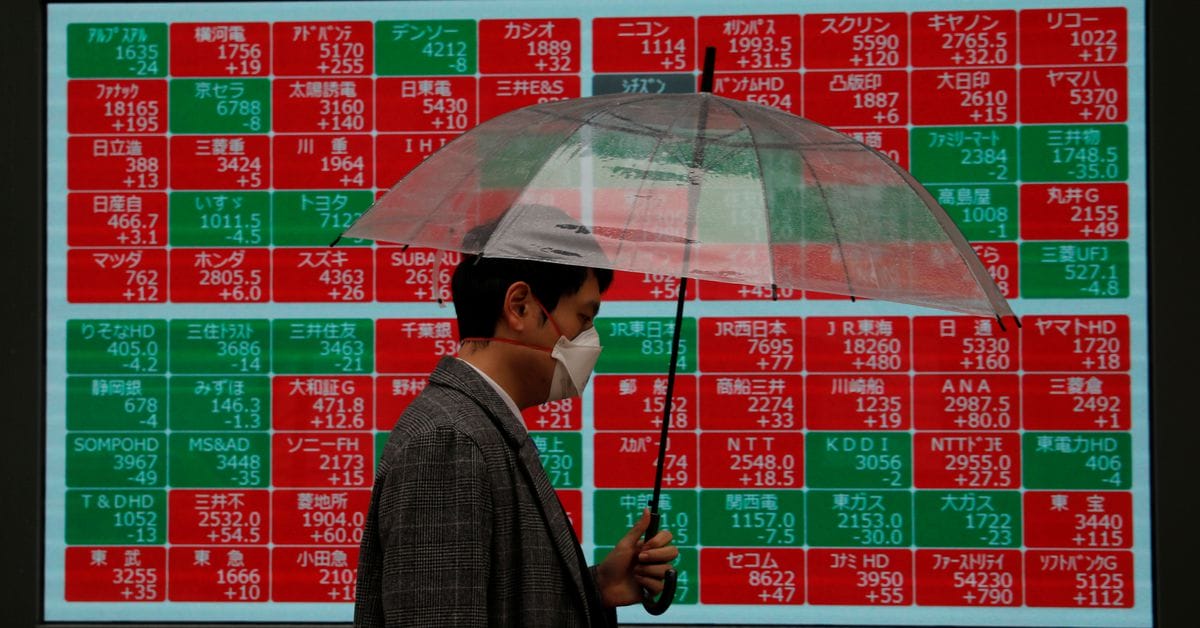A visitor wearing a protective face mask, after the outbreak of the coronavirus, passes in front of a stock price board outside a brokerage in Tokyo, Japan, March 2, 2020. REUTERS/Issei Kato/Files
TOKYO (Reuters) – Asian stocks extended their global slump on Friday after the fastest inflation in the United States in four decades and a hawkish European Central Bank boosted expectations of further interest rate hikes, undermining sentiment already battered by the Ukraine war.
Sellers swept Chinese stock markets after US-listed Chinese stocks fell after the first Chinese companies to be delisted were named.
Risk appetite suffered more broadly as investors brace for faster tightening of monetary conditions after Thursday’s data showed a 7.9% annual jump in US consumer inflation in February, the largest increase in 40 years.
Register now to get free unlimited access to Reuters.com
In morning trade in Asia, the broadest MSCI Asia Pacific Index outside Japan (MIAPJ0000PUS.) It slipped 1.7%, as the decline on Wall Street extended to several state benchmarks in the region, which turned deep red.
Hong Kong’s Hang Seng Index (.for him) And fell 3.5%, with shares of Yum China (9987.HK)and four other firms were hit after the firms were embroiled in an audit dispute between Beijing and Washington. Read more
The sell-off in Chinese stocks came even as the country’s securities regulator said on Friday it was confident it would reach an agreement with its US counterparts on securities supervision. Read more
Outside of Hong Kong, losses in Chinese stocks were lower, with the country’s blue chip index (.CSI300) down 1.3%.
Elsewhere, Japan’s Nikkei مؤشر (.N225) Lost 2.4% while South Korea’s stock lost (.KS11) And Australia shares fell 1.0% (.AXJO) It decreased by 0.9%.
Sentiment also did not improve after talks between the foreign ministers of Ukraine and Russia on Thursday brought a little lull in the conflict between the two countries.
“Disappointingly, although widely expected, the Russian-Ukrainian talks failed to produce a positive outcome,” said Rodrigo Cattrell, senior foreign exchange analyst at NAB in Sydney.
Analysts believe that Russia’s war against Ukraine will push inflation around the world even more because it will raise the prices of oil and other commodities.
Goldman Sachs cut its forecast for US real GDP growth for 2022 to +1.75% from +2.0% previously to reflect high oil prices and other impediments to war-related growth in Ukraine.
While markets widely expect the US Federal Reserve to raise the federal funds target rate by 25 basis points at the conclusion of next week’s monetary policy meeting, CPI data indicated that the Federal Open Market Committee could move “more aggressively” to curb inflation. , as promised by the Federal Reserve Chairman. Jerome Powell last week. Read more
The European Central Bank said on Thursday it will halt bond buying in the third quarter, opening the door to higher interest rates as rising inflation outweighs concerns about economic growth being hurt by Russia’s invasion of Ukraine. Read more
“It is clear that the ECB meeting was more hawkish than expected,” said Chris Weston, head of research at brokerage Pepperstone in Melbourne.
“We see 11 basis points for a rate hike in the EU by the July ECB meeting.”
In the currency market, the euro was up 0.13% at $1.0997, as the hawkish tone from the European Central Bank failed to significantly boost the momentum of the single currency.
“The European Central Bank has given more clarity to its stimulus exit plans, but it is unlikely to give the euro a sustainable boost, not while the conflict between Russia and Ukraine continues,” Westpac analysts said in a morning note.
The yen was trading at 116.25 per dollar, after briefly falling to a five-year low of 116.39 per dollar.
dollar index (DXY.) It settled at 98.491, below a more than 1-1/2-year high of 99.418 hit on Monday.
In the bond market, the 10-year US Treasury yield was 1.9671%, while the Japanese 10-year government bond yield was 0.185%.
In the commodity markets, US crude fell 0.4% to $105.6 a barrel. Brent crude fell 1.0 percent to $108.15 a barrel.
Gold was flat. Spot gold was trading at $1,995.65 an ounce.
Register now to get free unlimited access to Reuters.com
(Covering) Written by Daniel Losink in Tokyo Editing by Shree Navaratnam
Our criteria: Thomson Reuters Trust Principles.






